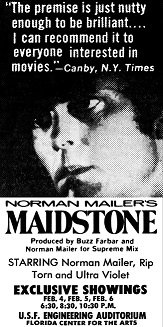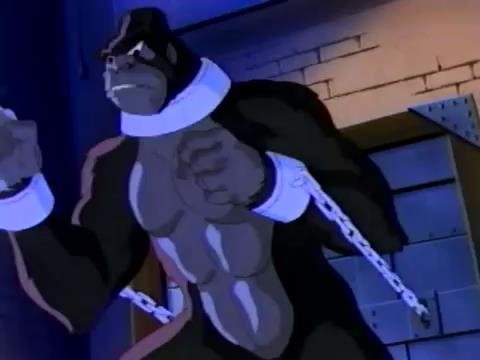In This Installment of Shards from the Fractured Mirror I Cover Maidstone, Memories of Me, The Mighty Kong, Please Stand By and Star 80
Maidstone (1970)
Norman Mailer’s insufferable 1970 vanity project Maidstone is best known for an on-set fight where Rip Torn, who played the brother of Mailer’s character, got to live out the fantasies of the audience by attacking Mailer with a hammer. Mailer retaliated by biting off part of Torn’s ear. Mailer also lost his life savings, self-funding the movie. Mailer, nevertheless, got off easy. The controversial Pulitzer Prize winner should have become the first man in American history to be imprisoned for making a crime of a movie. The First Amendment covers a lot. It does not cover this.
The largely improvised art film, shot cinema verite style by a crew that includes legendary documentarians D.A. Pennebaker and Richard Leacock as cameramen, casts its writer-director as Norman Kingsley, an adventurous filmmaker acclaimed as the American Luis Buñuel, though at no point in the film does Kingsley display any talent whatsoever.
The hotshot director is working on a film about a brothel that seems like an excuse for the writer-director-star-financier to verbally degrade and exploit the army of beautiful, vulnerable women he has power over. Kingsley is simultaneously being considered as a bold, inspirational presidential candidate in the mold of Robert Kennedy, who was assassinated shortly before the film began production.
Mailer wanted desperately to capture the feverish intensity and confusion of the times, to say something profound, irreverent, and incisive about the excesses and ecstasy of the counterculture and Black Power movement. Instead he ended up with a film that says a lot about Mailer and his monstrous ego, none of it positive. The bad boy of American literature wanted to make a statement, a hip and happening manifesto, but ended up with a pointless, pretentious provocation.
The original cut of Maidstone was reportedly seven and a half hours long. The theatrical version ran a comparatively brisk 110 minutes but feels fifteen hours long. When Mailer bit off part of Torn’s ear in the infamous melee, he made the Payback star suffer for what can very generously be called art. Unfortunately, he made the audience suffer as well.
Memories of Me (1988)
Billy Crystal’s 1988 comedy-drama Memories of Me at least deserves credit for tackling moviemaking from an unusual angle. There have been plenty of movies about movie stars and actors but few about extra work, which is like acting but without all the pressure and dialogue.
In Memories of Me, which Crystal co-wrote with Eric Roth and produced alongside Alan King, casts the City Slickers cut-up as Abbie Polin, a successful New York surgeon who turns inward after having a heart attack.
With mortality on his mind, Abbie travels to Los Angeles to reconnect with his estranged father, Abe (Alan King), a big fish in the tiny pond of professional background artists. Abe is the King of the Extras, a showman and big talker who is forever bragging about tiny roles in classic films that he ostensibly played.
Acrimony morphs inevitability into fondness and love when Abbie takes an interest in his father’s career and helps score him a speaking role in a movie.
Memories of Me is engaging when it chronicles, with tremendous fondness, the curious subculture of professional extras who make a modest living blending into the crowd. The world of extras functions as a shadow version of Hollywood, with stars and traditions all its own.
The show-business aspects of Memories of Me also stand out because they provide a brief but welcome respite from the film’s half-baked and quintessentially Billy Crystal combination of shtick and sentimentality.
The Mighty Kong (1998)
Dudley Moore’s career ended with a whimper when he voiced cinematic flim-flam man Carl Denham and his very big discovery, King Kong, in the barely released, barely animated, barely feature-length 1998 musical cartoon The Mighty Kong. The Arthur star isn’t the only big-name slumming it for a paycheck. Two-time Academy Award-winning Disney legends The Sherman Brothers wrote songs that fall so short of their usual high standards that it’s mildly surprising that they were willing to accept credit or blame for them.
The Mighty Kong chronicles a location shoot for a jungle movie that faces unique production issues involving a new leading man who is mercurial, unpredictable, dangerous, and damn near impossible to direct.
So the movie-maker and his crew of weary, desperate opportunists knock the big guy out and take him to Manhattan for a famously ill-fated Broadway debut. He’s a real animal.
The Mighty Kong gives kiddies a King Kong who survives his big fall so that he does not depress even a single child and a romance between glamorous actress Ann Darrow and manly sailor Jack Driscoll that’s even more arbitrary and out of place than in other, superior versions of this story.
The 1933 and 2005 versions of this story are timeless masterpieces of storytelling, world-building, and technology. In sharp contrast, the Mighty Kong barely keeps up with the low standards of late 1990s direct-to-video animation.
Please Stand By (2018) FM
A screenwriting competition for the ultimate Star Trek script run by Paramount with a one hundred thousand dollar grand prize spurs Wendy, a strong-willed young autistic woman played by Dakota Fanning, to leave her sheltered, orderly, and predictable world and engage with the scary outside world in the charming coming of age comedy-drama Please Stand By.
Ben Lewin’s adaptation of Michael Golamco’s short play stars Fanning as a Trekkie who becomes obsessed with winning a screenwriting competition about her favorite subject, centered around Mr. Spock, pop culture’s preeminent patron saint of autistic outsiders. When it becomes too late to mail in her submission in time to meet the deadline, a woman who has always stayed close to home for various reasons finds herself venturing out onto the exhilarating, scary road to Hollywood, California, so that she can deliver it personally to Paramount herself.
Please Stand By’s meandering rhythm, dreamy tone, and abundant quirkiness will be instantly familiar to anyone who has spent time at film festivals or liberally tasted their offerings. The independent film is conventional in its empathetic exploration of life on the fringes, but it’s redeemed by Fanning's magnetic lead turn, which is authentic and compassionate in its depiction of autistic life without lapsing into caricature or stereotype.
Fanning is ably supported by a lovely cast of ringers smartly cast as strangers who see Wendy’s fundamental goodness and show her great kindness at crucial moments, most notably Marla Gibb as a nice old lady and Patton Oswalt as a Klingon-fluent police officer.
Please Stand By is a big-hearted, crowd-pleasing celebration of art and entertainment’s gift for bringing out the best in us, graced with a wonderful lead performance and blessed with a spirit of tremendous generosity.
Star 80 (1983) FM
Eric Roberts could very well have done too good of a job portraying pimp, murderer, and rapist Paul Snider, the horrifying villain of Star 80, Bob Fosse’s incendiary final film. The Runaway Train star is so convincing that it would be difficult, if not impossible, for audiences, filmmakers, and casting agents to see him as a romantic lead or light-hearted hero.
Fosse’s harrowing exploration of toxic masculinity and the dizzying, disorienting world of fame and celebrity opens at the end with a blood-smeared Snider raging impotently against a world with little respect for him and his doomed dreams of stardom, wealth, and power. The film then unfolds in flashback. It begins in 1978 when Snider hit on his future wife, Dorothy Stratten when she was a teenager working at a Dairy Queen.
Snider’s flash impresses Stratten because she is unworldly and not experienced enough to know any better. The pathetic pimp sees stardom in the beautiful young woman. He’s a small-timer who sees his gorgeous girlfriend as his ticket to the big time.
With single-minded focus, the pathetic pimp gets Stratten into Playboy, where she becomes a favorite of Hugh Hefner. Snider learns to be careful what he wishes for, particularly once his radiant, magnetic wife attracts the attention of Aram Nicholas, a hotshot director based on Peter Bogdanovich, who cast her in 1981’s They All Laughed and fell hopelessly in love with her.
Becoming a Playboy fixture is the best thing that could happen to Stratten’s budding career as an actress, model, and sex symbol, but it was the worst thing that could have happened to her marriage.
Getting cast in a major motion picture by a revered auteur elevates Stratten even further out of her estranged husband’s orbit. Snider can’t help but seem sad and desperate when compared to powerful father figures like Hefner and Nicholas, whose affair with Stratten doomed her already troubled marriage.
Snider loses Stratten to stardom, fame, movies, and a man who is everything he desperately wants to be but is not. The psychodrama features talking heads from Snider and Stratten’s lives, discussing Stratten’s ascent and Snider’s bleary decline. These sequences provide a much-needed respite from the brutal intensity of Roberts’ performance and offer fascinating alternative perspectives on the couple’s doomed relationship.
Star 80 is a morbidly compelling horror film with an unforgettable monster and a vulnerable heroine whose fate was sealed the moment she became involved with the man who helped make her but could not deal with the consequences of stardom.














